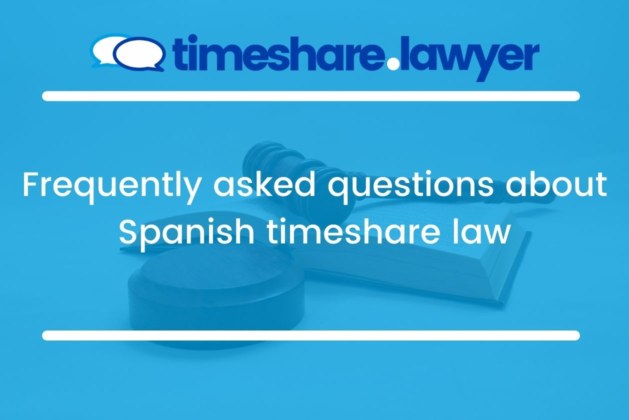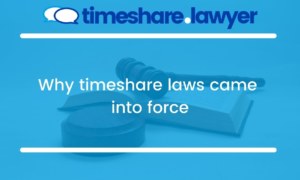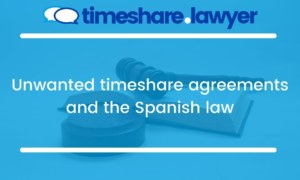Spain, including the Canary Islands, is the most popular country for timeshare in Europe. It’s no surprise, therefore, that it is also the place where lots of timeshare legal cases end up. At Timeshare.Lawyer, we are very experienced with the ins and outs of Spanish timeshare law, and very used to answering questions from timeshare holders about their rights regarding their Spanish timeshare. So, to make things a little clearer for you, we’ve put together some of the most frequently asked questions about Spanish timeshare law.
1. Do timeshare holders have to go to court?
Generally, no. Big decisions regarding timeshare law are made in the Supreme Court. Rulings made in the Spanish Supreme Court set a legal precedent that then facilitates all cases in lower courts, meaning that they can be settled easily.
Where a timeshare contract is found to be illegal, it can therefore be declared null and void and the timeshare company ordered to return the ill-gotten payments received from the claimant. Once it is confirmed that a contract contains an illegal clause, the court does not even have to look at it before applying the law.
This means you do not have to go to Court unless your case is one that has never been seen before – in which case it will have to go to the Supreme Court, where there will be a much bigger legal battle and less certainty of success. However, the Spanish Supreme Court has now ruled on many timeshare law cases, meaning that it is almost certain that you will not have to go to the Supreme Court for your timeshare legal case.
2. Should I Just Use A Spanish Lawyer?
Whilst any Spanish lawyer could represent you in Court, there are some risks. For example, there have been several cases of fraudulent legal firms operating in Spain, who have taken money from unsuspecting timeshare holders in order to fight their case only to disappear. Also, unless the lawyer you are dealing with is experienced in timeshare law specifically, they may not have the necessary knowledge to do the best job of handling your case. Equally, there could be translation issues.
3. My Spanish Timeshare Contract Was Signed Before 1999 – What Can I Do?
If you signed your timeshare contract before 4 January 1999, you will have much more trouble getting justice. This is because, prior to that date, timeshare in Spain was covered by consumer law. This means that it is a lot harder to challenge these timeshare contracts in Court. That being said, there may be loopholes that can be exploited when you engage a specialist timeshare lawyer who knows the ins and outs of timeshare contracts.
4. Is My Timeshare Contract Illegal?
So far, the Spanish Supreme Court has ruled that the following timeshare contracts are definitely illegal:
- Floating weeks (including holiday club schemes)
- Contracts signed in perpetuity (all timeshare contracts have to last over 50 years) or does not have an end date.
- Deposits or payments taken within 14 days of signing (extended to three months if there are any other illegal points in the contract).
The Spanish Supreme Court is also currently assessing contracts that contain the words ‘ownership’ or ‘property’. If they rule these to be illegal, then a whole new swathe of timeshare contracts could be deemed illegal.
As a result of these Spanish timeshare law rulings, people are gaining timeshare release and compensation on a weekly basis. The tide has turned, and timeshare companies are running scared.
UPDATE: Many cases in the Spanish courts currently are being nulled due to the fact of lack of information regarding the property purchased i.e. what the property consists of, where it is and when it can be used.
5. My timeshare contract is illegal – what does this mean?
Well, depending on the way in which the contract is illegal, you could either be eligible for compensation, to have any sums you’ve paid returned to you, or simply to have the contract nullified.
If a deposit or payment was taken during the 14-day cooling off period, or within three months if other elements of the contract are found to be illegal, then you will get double the sum of that payment or deposit back in compensation. This could be even more, depending on the sum you paid during that period.
Any floating weeks contract or ‘in perpetuity’ contracts (where the contract term is not specified or exceeds 50 years) are null and void. And because they are null and void, the timeshare company must return all the money you have paid them during the entire duration of the contract.
If misselling or misrepresentation can be proven, then timeshare compensation may be payable under Spanish timeshare law, but this can be difficult to prove. It very much depends on the context of your individual case.
6. Can the timeshare company wriggle out of it?
Timeshare resorts play dirty to get money from clients and play dirty to hold on to it. At every opportunity, the resort’s legal team will appeal the decision against them in a tactic to delay the owner from receiving any funds. It is the lawyer’s responsibility to object to every appeal and reason why the funds should not be released.
having said that, in cases like the above, Judgments made by the Spanish Supreme Court are final, and timeshare companies have no right of appeal.
If you have any further questions, please don’t hesitate to contact us.



